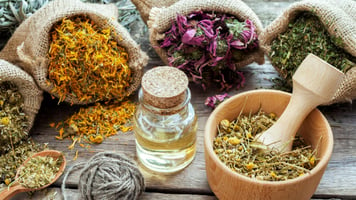Yoni steaming, or vaginal steaming is an ancient practice in multiple cultures that involves...
Ashwagandha, the Indian revitalizer
.png?width=1920&height=1080&name=Blog%20images%20(11).png)
Traditional Indian medicine, known as Ayurveda practice, well established in the south of the Asian continent, has one of its fundamental pillars in using medicinal plants. One of the essential plants used to create healing remedies is, since two thousand years ago, a modest nightshade known in Hindi as Ashwagandha. The rather unglamorous meaning of this double word ('ashva' and 'gandha') would be the 'smell of horse urine,' an appreciation that is usually always subjective.
But, at an informative level and as a resource to characterize its healing power, in some sources, it has also been baptized as Indian ginseng since it rivals Chinese ginseng as a powerful natural revitalizer intended to alleviate psychosomatic problems such as stress, insomnia, or anxiety, and as a very effective therapeutic against weakness and nervous fatigue.
Active ingredients of Ashwagandha or 'Withania Somnifera.'
Like most species of the Solanaceae family, Withania also contains nitrogenous compounds called alkaloids, which give it a margin of relative toxicity. But some steroidal lactones, baptized by biochemists as withanolides, provide Ashwagandha with remarkable healing power and have drawn experts' attention.
The root is harvested for medicinal purposes, but the leaves, fresh berries, and seeds have also been used.
The active principles of Ashwagandha that define its therapeutic action are listed below:
- Alkaloids 12 different ones are present in Ashwagandha, among them somniferous, or pseudotropine, which endows it with narcotic, analgesic, and sedative virtues.
- Steroidal lactones it is worth noting two that are very pharmacologically active, withaferin A and withanolide D, which are the ones that transmit their adaptogenic and anti-inflammatory action to the plant, acting in the body as if they were steroidal hormones.
- Triethylene glycol, a compound used in chemistry as a solvent, has been proven effective in combating insomnia in clinical trials with mice.
- Flavonoids with antioxidant capacity.
- Mineral salts, especially iron, and potassium.
These components are responsible for its already mentioned medicinal properties such as mild narcotic, analgesic, relaxant on the central nervous system, tonic, adaptogen, anticonvulsant, anti-inflammatory, antioxidant, antirheumatic, anti-anemic, and stimulating.
20 health benefits of ashwagandha
Ashwagandha can be a natural aid to a wide variety of people affected by emotional, psychological, metabolic, and physiological problems due to its remarkable therapeutic versatility, in its double-function sedative and invigorating.
As you can see, the benefits of ashwagandha for health are numerous, which is why experts recommend it for the following cases.
(Always consult a specialist before taking Ashwagandha)
- Stress reduction: it is an adaptogenic remedy. This relatively recent term defines the capacity of a substance to help us face an adverse or changing situation, allowing us to cope with it in better conditions. Withania effectively reduces excess stress, a psycho-emotional condition that can lead to other disorders. A study conducted at the Prakruti Hospital in Mumbai showed that it can help manage stress mediators, such as cortisol, and improve sleep quality.
- Promotes sleep: ashwagandha facilitates sleep and helps you alleviate insomnia. Experiments with mice have shown the action of withanolides and tri-ethylene glycol to settle the REM phase of sleep, in which the deepest and most restful sleep develops. Research on the elderly conducted by Indian hospitals also showed that ashwagandha root extract effectively improved this population's quality of life, sleep, and mental alertness.
- Anxiety relief: due to its nature as a revitalizing plant, it has been used to treat mild and specific depressive and anxious states. A study carried out at Murdoch University (Perth, Australia) confirmed that taking 240 mg of ashwagandha extract daily for two months had a moderating effect on the hypothalamic-pituitary-adrenal axis, resulting in significant reductions in anxiety.
- Mental relaxation: in India, ashwagandha is used to clear the mind and promote mental peace.
- Raises energy: it is an outstanding revitalizer, intended primarily for older adults, to stop the loss of spirits and vitality and to combat asthenia.
- Fight anemia: the whitania is also intended to combat nervous fatigue, weakness, and anemic states due to lack of iron. Ashwagandha treatments can significantly raise hemoglobin and erythrocyte (red blood cell) levels in people who are weak and convalescent from illness.
- Reinforcement for athletes: some studies have tested its potential for improving athletes' performance, increasing respiratory capacity during intense physical activity, and increasing muscle strength. In endurance sports, a paper by Indian researchers suggests that ashwagandha supplementation is associated with significant muscle mass and strength increases.
- Mitigates the effect of antipsychotics: their use has been evaluated to minimize the side effects of taking antipsychotic medications used in the treatment of schizophrenia by mitigating the possible increase in lipid and sugar levels that these could generate. A study by the University of Pittsburgh also points out that taking Withania Somnifera for 12 weeks can help treat the worsening of symptoms in schizophrenia.
- Diabetes control: Meta-analyses suggest that Indian ginseng may be helpful in the treatment of diabetes by helping to restore disturbed blood glucose levels. Another work from an Israeli research center indicates that the leaf extract, but not the root, increased insulin secretion in basal pancreatic beta cells and the ability to absorb glucose in the blood.
- Promising for the thyroid: it is credited with a stimulating effect on the thyroid gland; it favors the production of thyroid hormones and has been tested for the treatment of hypothyroidism, but conclusive studies are lacking in this regard.
- Reduction of inflammation: its anti-inflammatory and analgesic action effectively relieves rheumatic pain and reduces the inflammatory process in rheumatoid arthritis and incipient osteoarthritic states. Its effect in reducing protein levels and inflammatory markers has been tested in animal studies, adults, and patients with COVID-19.
- Management of hypertension and cholesterol: in India, ashwagandha is also intended to lower blood pressure in patients with high and moderately high blood pressure and reduce LDL cholesterol levels.
- For fluid retention: Font de Quer recounts in his excellent 'Renewed Dioscorides' that the fruit violently provokes urine and that, taken in twelve numbers, it was recommended to attack dropsy (fluid retention in internal tissues).
- Dental pain relief: the same source reminds us that the fruits had been used to relieve tooth pain as an infallible narcotic.
- Sex Positive: In Ayurvedic medicine, Ashwagandha has also been reported to enhance sexual response and promote fertility. Thus, an Indian study showed that it increases testosterone by almost 15% in overweight men.
- Promising against hyperactivity: it is also intended for treating attention deficit disorder due to nervous hyperactivity, although its efficacy has not been scientifically proven.
Contraindications
Ashwagandha, or Withania, cannot be consumed freely without taking the necessary precautions, as with most medicines. Its high content of active alkaloids makes it incompatible with certain medical conditions and for certain people. Therefore, you must get proper advice before deciding to use it.
As a general guideline, we will tell you that the consumption of Ashwagandha is contraindicated in the following cases:
- During pregnancy and the lactation period.
- Under no circumstances should Withania be administered to children under 12.
- It should be avoided in cases of hyperthyroidism, as Ashwagandha can increase the amount of thyroid hormones the body produces.
- In the case of following medical treatment for depression or anxiety, it is absolutely imperative to consult your doctor before consuming this plant. It is incompatible with anxiolytics and antidepressants such as zolpidem, clonazepam, sertraline, and others.
- If you take sleeping pills, adding Ashwagandha to them could worsen your sleepiness. Again, check with your doctor.
- In no case should withania replace the medication that your doctor or psychiatrist has prescribed.
- If it is used as a sedative, exceeding the prescribed doses should be avoided.
- In case of gastric sensitivity, if you suffer from recurrent episodes of gastrointestinal irritation and gastrointestinal ulcer, consult your doctor before starting treatments with Ashwagandha.
- It should not be taken if sensitivity or allergy to nightshades is detected.
- Withania is very rich in iron, so it is not prudent to take it in case of hemochromatosis, a hereditary pathology with excessive iron absorption from foods containing it.
- If you are taking medication for hypertension or high cholesterol, consult your doctor to avoid unwanted decompensation.
- Ashwagandha seeds contain some toxicity, so it is advised to avoid them.


.png?height=200&name=Kari%20(2).png)
.png?height=200&name=Blog%20images%20(13).png)